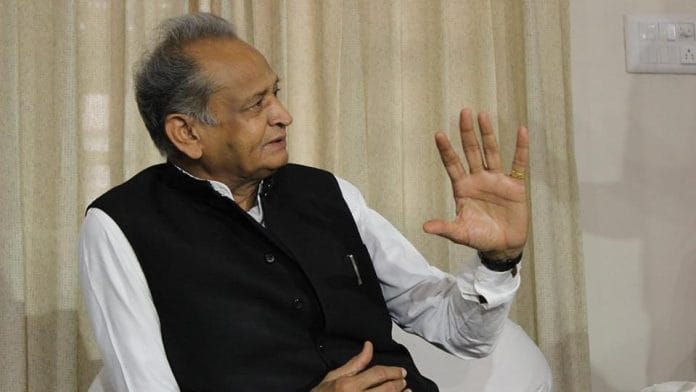Newly-appointed Rajasthan CM Ashok Gehlot has a reputation of being a shrewd politician and one with a ‘clean image, ground-level connect and accessibility’.
New Delhi: Ashok Gehlot, 67, who will now head the state of Rajasthan, is often dubbed as the “chief minister of party workers”.
It’s a reputation that the two-time Rajasthan chief minister — this will be his third stint at the helm — has earned by being accessible to party workers as well the general public. He is also well-known for his deft political management and his ability to keep his flock together.
The Congress now believes that Gehlot’s “clean image, ground-level connect and accessibility” could prove to be an asset ahead of the 2019 Lok Sabha elections.
The social worker
Gehlot was born into a family of professional magicians at Jodhpur on 3 May 1951.
While he too practised magic in his early days, the chief minister holds a B.Sc degree, an M.A in Economics and an LL.B degree from Jodhpur University.
He began his public life as a “letter writer” in hospitals, said a Congress functionary who has followed his political career closely.
According to the party leader, in the 1970s while doing social work in hospitals, Gehlot realised that patients were not able to inform their families about their well-being. It was then that he offered to help and began writing letters to family members on behalf of the patients.
“We didn’t have mobile phones or rather we didn’t even have phones at that time. Letters were the medium of communication,” said a Congress functionary. “People used to come to this hospital from as far as 500 km within the state and to ensure the family members got regular updates, Gehlot used to write for them.”
Also read: 5 reasons why Rahul Gandhi picked Ashok Gehlot over Sachin Pilot
Early political career
Gehlot’s first brush with politics was when the Congress spotted him while he was working at refugee camps in West Bengal, which was housing migrants from East Bengal during the 1971 crisis.
He was spotted by former Prime Minister Indira Gandhi, who noticed his organisational skills. She appointed Gehlot as the Rajasthan president of the National Students Union of India (NSUI), the Congress’ student wing, in 1974.
He moved up the political ladder but lost his first assembly election in 1977. But in keeping with his reputation, which has stuck to this day, Gehlot was reportedly out on the streets thanking people for having voted for him.
His first victory came in the 1980 general elections when he won a Lok Sabha seat from Jodhpur. In 1982, he was appointed the general secretary of the Rajasthan Pradesh Congress Committee.
Gehlot the parliamentarian
The chief minister has also been elected to Parliament on five occasions — in 1980, 1984, 1991, 1996 and 1998. During his last stint in 1998, he resigned from Parliament, to contest an assembly by-election, after he was appointed Rajasthan chief minister.
Gehlot has on a number of occasions served in the Union cabinet. He was deputy minister, Department of Tourism, between 1982 and 1983; deputy minister, Department of Tourism and Civil Aviation (1983-84); deputy minister, Department of Sports (1984-84); union minister of state, Department of Tourism and Civil Aviation (1984-85); and union minister of state, Department of Textiles (Independent Charge) (1991-93).
Gehlot has also served as the president of the state Congress unit between 1985 and 1989, and from 1994 to 1999.
In 2004-2008, he served as the general secretary of the All India Congress Committee for the first time. In 2017, he was appointed general secretary of the All India Congress Committee for the second time.
Tenure as CM
Gehlot has had two earlier stints as the Rajasthan chief minister. He first assumed the mantle between 1998 and 2003 while his second term lasted from 2008 to 2013.
The two stints were punctuated by a BJP regime under outgoing chief minister Vasundhara Raje, whom Gehlot has once again replaced.
In his first term, Gehlot earned praise for his drought relief measures, which later formed the basis of the nationwide National Rural Employment Guarantee Scheme. He is also credited for bringing a right to information (RTI) law even before it became a national legislation.
In his second term, Gehlot closed down about 800 liquor shops. He had earlier said that his move would prevent “boys and girls going hand-in-hand” to pubs and clubs. Gehlot also launched a free medicine scheme in 2009, which was so popular that even the following Raje government stuck on with it.
Critics, however, say that Gehlot has trouble handling the bureaucracy. “He isn’t a hard taskmaster and doesn’t instil fear in the officers as Raje does,” says a former bureaucrat.
The chief minister also has a reputation of being a poor orator.
Also read: Ashok Gehlot is Congress pick for Rajasthan CM, Sachin Pilot to be his deputy






